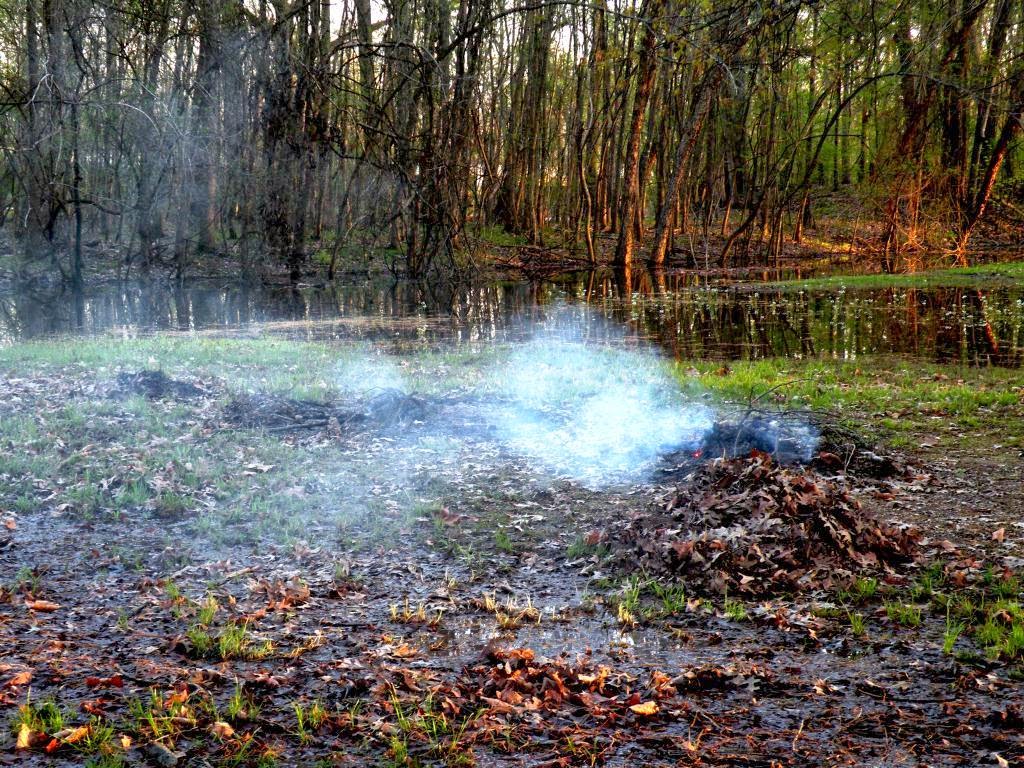Battle site: Jenkins' Ferry, Arkansas. Or more properly, the area where Union forces crossed the Saline River on a pontoon bridge, heading back to their main base in Little Rock.
At Jenkins Ferry, two American armies went at each other viciously. The Confederates aimed to destroy most of the Union column before it could cross the river. Resulting casualties: approximately 700 Federals and 900 Rebels. Union tactical victory, in that the crossing was successfully made and the pontoon bridge destroyed to prevent easy pursuit. The battle was fought 150 years ago today: April 30, 1864.
Jenkins' Ferry was and is a water-logged part of the Saline River Bottoms. If you click on the image here, it may be easier to read the text. 150 years ago, the Jenkins' Ferry battle site was foggy, smoke-filled and soggy.
At Jenkins' Ferry, the men of the 2nd Kansas Colored Infantry Regiment were fighting for their lives: west of the Mississippi in 1864, Confederate practice was typically to kill surrendering black troops (and more randomly, unarmed freedmen) on the spot, as had been done at Poison Springs and Marks' Mills. In response at Jenkins Ferry, this black regiment launched a bayonet charge that overran a Rebel battery of artillery; men of the regiment bayoneted perhaps dozens of surrendering Confederate artillerymen and their supports, reportedly cutting the throats of wounded mired in the mud. They then made their way across the Saline River. The 2nd Kansas Colored Infantry Regiment was later reorganized as the 83rd Regiment, United States Colored Infantry. Here's a link to their muster out roll. The first thing that becomes clear from this muster roll of soldiers is that they have full names, not single names such as designated by masters or owners -- the practice under slavery. These men fought in the war at least in part to expand and consolidate freedom, aiming for a more equal "place at the table" of American society.
Today's Rune: Initiation.
At Jenkins Ferry, two American armies went at each other viciously. The Confederates aimed to destroy most of the Union column before it could cross the river. Resulting casualties: approximately 700 Federals and 900 Rebels. Union tactical victory, in that the crossing was successfully made and the pontoon bridge destroyed to prevent easy pursuit. The battle was fought 150 years ago today: April 30, 1864.
Jenkins' Ferry was and is a water-logged part of the Saline River Bottoms. If you click on the image here, it may be easier to read the text. 150 years ago, the Jenkins' Ferry battle site was foggy, smoke-filled and soggy.
At Jenkins' Ferry, the men of the 2nd Kansas Colored Infantry Regiment were fighting for their lives: west of the Mississippi in 1864, Confederate practice was typically to kill surrendering black troops (and more randomly, unarmed freedmen) on the spot, as had been done at Poison Springs and Marks' Mills. In response at Jenkins Ferry, this black regiment launched a bayonet charge that overran a Rebel battery of artillery; men of the regiment bayoneted perhaps dozens of surrendering Confederate artillerymen and their supports, reportedly cutting the throats of wounded mired in the mud. They then made their way across the Saline River. The 2nd Kansas Colored Infantry Regiment was later reorganized as the 83rd Regiment, United States Colored Infantry. Here's a link to their muster out roll. The first thing that becomes clear from this muster roll of soldiers is that they have full names, not single names such as designated by masters or owners -- the practice under slavery. These men fought in the war at least in part to expand and consolidate freedom, aiming for a more equal "place at the table" of American society.
Today's Rune: Initiation.














2 comments:
And America pulled that chair of equality at the table out for whom and when?
About the war though, brutality breeds brutality, ugly is known for ugly children.
what a nasty, nasty war that was.
Post a Comment